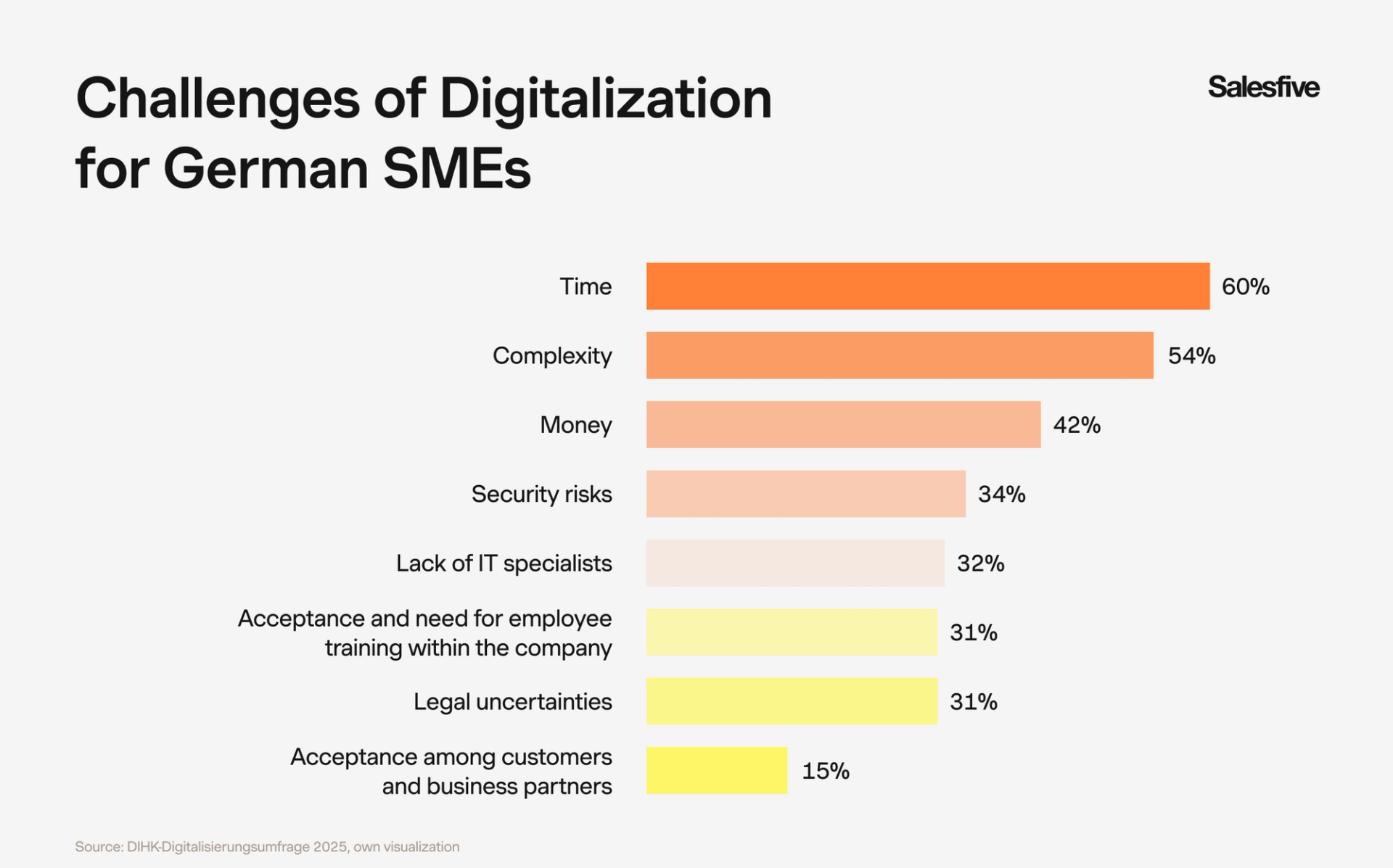Why digitalization is so important
Date
June 03, 2025
Reading time
4 Minuten

At a glance
- Companies must consciously address the possibilities of digital transformation in order to survive on the market in the long term.
- They have to overcome habits, rethink business models and find new ways to create added value for customers.
- Digital technologies are drivers of transformation, but they only unfold their value if processes, people and culture go along with them.
- Digitalization helps companies to tap into new markets, grow faster and flexibly scale their business models.
- Despite all the challenges, SMEs are pushing ahead with digitalization and establishing AI in practice.
What is digitalization?
Digital technologies are influencing the economy, politics and society and the way we live. We are always and everywhere accessible, communicate and obtain information online, shop, work remotely and network processes and products with each other. As far as we know. But what exactly is digitalization?
Digitalization means transferring analogue processes, data and content into a digital form. No industry and hardly any company in the western world can escape it. Companies are driving forward the integration of new technologies and investing in artificial intelligence (AI) and automation. At the same time, entire industries are changing and business models are being rethought.
For example, companies are networking data, processes, departments and people, or equipping production facilities with sensors. They collect and analyze the information centrally. The resulting data volumes are enormous and provide the basis for well-founded decisions, strategic orientation and new services. In manufacturing, they even make it possible to operate production facilities intelligently and with foresight.
Technologies such as cloud platforms, AI, the Internet of Things (IoT) and business analytics are driving this development. However, they will only unfold their full potential if processes, people and corporate culture also consistently follow suit.
The stages of digitalization
It is more important than ever for companies to understand how they can take advantage of the opportunities offered by digitalization. They need to overcome habits and convenience, rethink business models and find new ways to create added value for their customers. However, those who want to protect the status quo will sooner or later be left behind by the competition.
However, digitalization does not mean introducing innovative technologies from one day to the next. Digitalization is a process that companies should go through to achieve sustainable success. The process can be divided into three stages, known as maturity levels. They enable a step-by-step, successive implementation and make progress measurable.
Stage 1: Basic digitization
Analog content and manual processes are replaced by digital formats and working methods. IT systems for enterprise resource planning (ERP) or customer relationship management (CRM) are being introduced for core processes.
Example: paperless document management, digital accounting
Stage 2: Integration and networking
Processes are networked across departments and data is analyzed in a targeted manner. Cloud technologies, automated workflows and data-based decision-making tools are integrated.
Example: networked production and supply chains
Stage 3: Complete digitalization
Fully data-driven business models and agile structures are established. The potential of data is fully exploited with technologies such as data analytics and AI.
Example: automated sales processes with machine learning
CRM systems as part of digitization
CRM systems such as Salesforce are a central component of companies’ digitalization strategies. They network and automate processes and create a standardized and reliable database. In this way, they increase efficiency and productivity and, together with other data sources, form the basis for new, digital business models and innovative products.
The advantages of digitalization
Digitizing simply because you cannot avoid it is not enough. If you want to successfully introduce digital systems, you also need to know their advantages. Only then can new technologies and processes be used in a targeted manner and achieve their full effect.
Digitalization helps companies to tap into new markets, grow faster and scale their business models flexibly. It makes it easy to create, retrieve, process and exchange data – regardless of time and location. This makes workplaces more flexible and global collaboration easier.
Tasks, processes and entire business areas can be networked and automated. Processes become faster, less error-prone and more cost-effective. At the same time, employees can hand over monotonous tasks and concentrate on more important activities. This increases productivity.
Digital systems continuously analyze large volumes of data. This enables companies to recognize trends at an early stage, make informed decisions and react more quickly to changes. The most important goal is to meet individual needs. To achieve this, companies personalize offers and services, develop digital products and establish new communication channels.
In addition to quality, customers are placing more and more value on flexibility, choice and individuality. These factors are increasingly influencing purchasing decisions. With well-considered digitalization strategies, customers are becoming even more important. Tailor-made, digital offers appeal directly to target groups, while independence of time and place creates a wide range of opportunities for holistic customer service.
The benefits of digitization are many and varied, but they all have one thing in common: they save a lot of time and resources.
Digitalization in the SME sector
99 percent of companies in Germany are SMEs. Together, they provide more than half of all jobs. It is therefore crucial for the German economy and millions of employees that these companies remain competitive in the future. A decisive factor here is, you guessed it, digitalization.
A few years ago, many SMEs were still in the first phase of digitalization. They were converting analog systems and processes into digital solutions. Now it's time to take the next step and centrally network data, processes and teams. Depending on the industry and company, this can go as far as complete digitalization, with data-based business models and smart products.
German SMEs have long recognized the opportunities and necessity of digitalization, but are also facing major challenges. The German Chamber of Industry and Commerce surveyed around 5,400 companies as part of its Digitalization Survey 2025. The results show confidence: despite all the hurdles, companies are consistently pushing ahead with digitalization and AI is also becoming increasingly established in practice.

Conclusion
The digital transformation is unleashing almost limitless potential for companies – from global technology groups to small and medium-sized enterprises. New sales channels are emerging, processes are being automated and personalized customer journeys are increasingly determining the competition.
CRM systems such as Salesforce play a central role here: they network workflows, automate processes and create a standardized database. This increases efficiency and productivity throughout the company. Together with other data sources, they also form the basis for developing new digital products and innovative business models.

